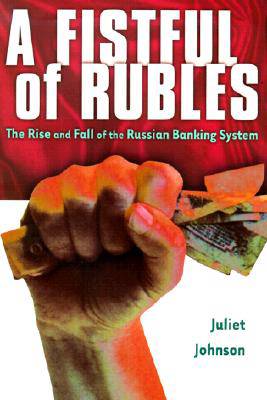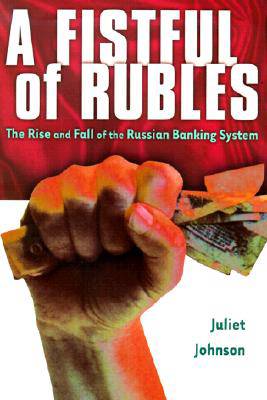
- Retrait gratuit dans votre magasin Club
- 7.000.000 titres dans notre catalogue
- Payer en toute sécurité
- Toujours un magasin près de chez vous
- Retrait gratuit dans votre magasin Club
- 7.000.000 titres dans notre catalogue
- Payer en toute sécurité
- Toujours un magasin près de chez vous
A Fistful of Rubles
The Rise and Fall of the Russian Banking System
Juliet JohnsonDescription
After the breakup of the USSR, it briefly appeared as though Russia's emerging commercial banks might act as engines of growth for a new capitalist economy. However, despite more than a decade of "reforms," Russia's financial system collapsed in 1998. Why had ambitious efforts to decentralize and liberalize the banking industry failed? In A Fistful of Rubles, Juliet Johnson offers the first comprehensive look at how Russia's banks, once expected to revitalize the nation's economy, instead became one of the largest obstacles to its recovery.Drawing on interviews with Russian bankers, policymakers, and entrepreneurs, Johnson traces the evolution of the banking system from 1987 through the aftermath of the 1998 crash. She describes how dysfunctional institutional procedures left over from the Soviet period hindered the subsequent development of sound financial practices. Johnson argues that these legacies, along with misguided, Western-inspired liberalization policies, led to the creation of parasitic banks for which success depended on political connections rather than on investment strategies. Johnson demonstrates that banking reform efforts ultimately did more harm than good, because Russian officials and their international advisers failed to build the corresponding economic, legal, and political institutions upon which modern market behavior depends.
Spécifications
Parties prenantes
- Auteur(s) :
- Editeur:
Contenu
- Nombre de pages :
- 272
- Langue:
- Anglais
Caractéristiques
- EAN:
- 9780801437441
- Date de parution :
- 07-11-00
- Format:
- Livre relié
- Format numérique:
- Genaaid
- Dimensions :
- 152 mm x 229 mm
- Poids :
- 544 g







